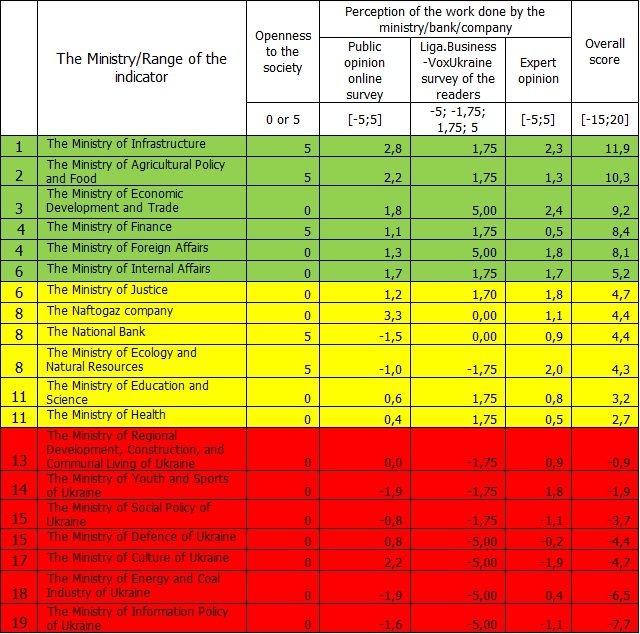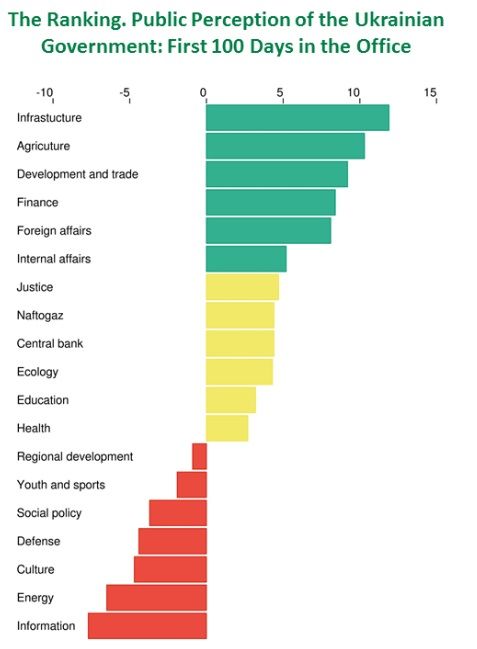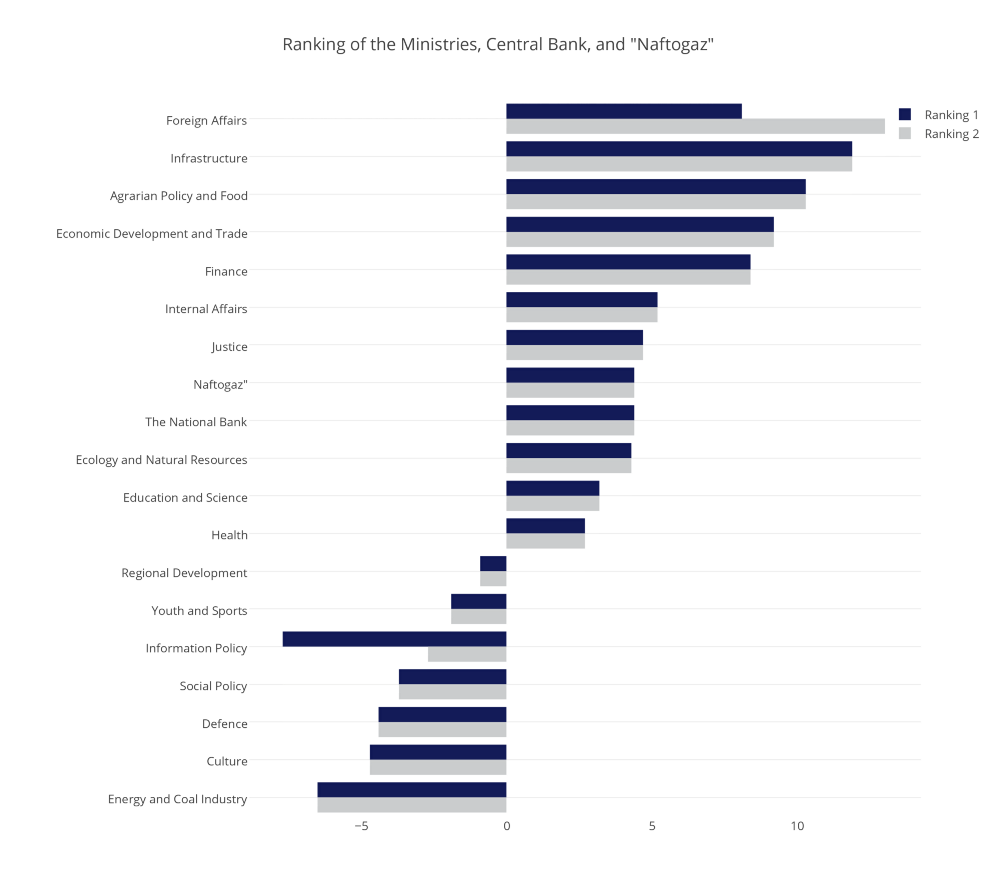The 2014 Maidan Revolution in Kyiv has led to a new president, a new parliament, and a new national government of Ukraine. The previous president of Ukraine, Viktor Yanukovych abandoned his office and fled the country in late February last year. The new president Petro Poroshenko was elected three months later. The new parliament of Ukraine was elected in the fall of 2014. A month later, on December 2, 2014, the parliament approved the new cabinet.
The new cabinet of Ukraine is unprecedented in many ways. Out of twenty members of the cabinet, fourteen members have not served in previous governments. Seven members come from industry and are novices in politics. Three ministers are foreign nationals and were granted Ukrainian citizenship so that they could join the cabinet. The average age of ministers is just a little over 44 years.
Yet, the bureaucracy of the ministries and governmental agencies is staffed with political veterans. The new ministers have been facing the daunting task of identifying competent and honest people who can serve national interests. But the incumbents do not go out without a fight. Being skillful at sabotage, they try to weaken political support for the new ministers, use the judicial system to challenge the lawfulness of new appointments, and even employ thuggish methods such as threats and physical force.
The Ukrainian cabinet serves in the most trying times since Ukraine regained its independence in 1991. Ukraine faces enormous challenges. Its economy is in deep recession, its currency is under attack, the financial system is in crisis, the public confidence is poor. The powerful neighbor Russia employs an entire array of military, political, diplomatic, economic, and media tactics to destabilize Ukraine. The government must act fast to push through structural reforms, stabilize economy, and put the country on a growth path.
VoxUkraine, jointly with KSE/EERC, Index of Monitoring Reforms, Reanimation Package of Reforms, and the Reform Support Centre have prepared a ranking of the first 100 days of the ministries, the National Bank of Ukraine and Naftogaz, the state-owned monopolist in the gas market.
We evaluated how general public, the media, and the expert community see the work of the ministries, the Central bank, and Naftogaz. As the first step, we have sent letters to all the ministries, the central bank, Naftogaz, using the publicly available contacts on the official web-sites and pages in the social media. We asked them several questions about the most notable achievements during 100 days, the major challenges, plans and problems. Only several ministries replied – the Ministry of Finance, the Ministry of Ecology, the Ministry of Infrastructure, the Ministry of Agriculture, and the National Bank. As the second step, we have developed and conducted 3 surveys. The first two surveys – Expert Survey (128 respondents) and Public Opinion Survey (220 respondents), asked to evaluate the most substantive actions and events reported in the media. Every event was assessed on a scale from -5 (unsatisfactory) to 5 (outstanding). The Expert Opinion Survey respondents included experts from VoxUkraine, KSE/EERC, Index of Monitoring Reforms, Reanimation Package of Reforms, and the Reform Support Centre. The third survey was conducted by Liga.Business (3017 respondents) and asked for the general perception of the performance of each ministry.
The overall scores for each ministry are presented on the diagram below.
Ranking 2 was made after publication when 2 Ministers submitter their replies.
Conclusions
- There is a clear group of ministries that outperform others. They have their objectives stated clearly and they have embarked on reforms. They also communicate their actions/choices to the public.
- Evaluations by the general public and the experts are generally consistent with each other. However, experts tend to view the ministries more favorably than the public. The average score by experts is close to one while the average score by the public is negative.
- Several ministries have suffered from negative evaluations by the public yet received strong evaluations by the experts. These cases are especially important as they highlight an informational disconnect between the particular ministry and the public. In other words, while experts appreciate reforms, the public is not sufficiently informed about the progress. The list includes:
-The Ministry of Regional Development, Construction, and Housing;
-The Ministry of Youth and Sports;
-The Ministry of Energy and Coal Industry;
-The Ministry of Ecology and Natural Resources;
-The National Bank of Ukraine. - The highest score is well below the maximum. The Ministry of Infrastructure, the champion of the comparison, received only the score of 12, while the maximum is 20. The median score is meagre 3.
- Many ministries received negative scores suggesting the public and the experts think that they are ruther impede the reforms, and positive changes. For example, the Ministry of Social Policy and the Ministry of Information have negative scores from every group of respondents.
- The society appears to understand that some sacrifices are needed for Ukraine to become a better country. As a result, tough reforms do not automatically lead to a low ranking. For example, rising gas prices are clearly painful. Yet, the public and the experts think highly of Naftogaz. Indeed, while previously it was an epitome of corruption and embezzlement, these days one rarely–if ever–hears news about glaring embezzlement, bribery and nepotism in Naftogaz. In contrast, the public is extremely critical of the Ministry of Energy and Coal Industry, which is plagued by scandals.
- Sadly, some of the lowest scores are concentrated in ministries with largest spending (e.g. Ministry of Social Policy, Ministry of Defence, Ministry of Energy and Coal Industry).
- There is a negative relationship between the minister age and the overall score (see the figure below). In a similar spirit, ministers who are political veterans–i.e., served in previous governments or were MPs in several Radas–tend to have lower scores. Most of this relationship is driven by the public’s scores which stresses demand for new faces in the government as well as, perhaps, demand for new approaches to break the status quo.
In summary, the government has made significant progress over its first 100 days. However, the society demands more. A lot more! Some reforms obviously require thorough preparation, repeated testing, and thoughtful design, which takes time, but the government can improve its perception quickly and cheaply by radically enhancing its communication strategy. Positive developments appear more apparent to experts than to the public, a gap that can be closed by an aggressive information campaign. Public support is vital for the success of reform and one can hope that the government is going to be more proactive on this front in its next 100 days.
Media Partners: Interfax , Liga.net
Authors: A working group consisting of members of the Editorial Board, and Contributors of VoxUkraine:
Olena Bilan (Dragon Capital), Volodymyr Bilotkach (Newcastle U.), Tom Coupé (KSE), Veronika Movchan (IER), Tymofiy Mylovanov (U.of Pittsburgh), Yuriy Gorodnichenko (UC Berkeley), Ilona Sologub (KSE), Olexander Talavera (U. Of Sheffield), Oleksandr Zholud (International Center of Policy Studies), Oleg Korenok (Virginia Commonwealth University), Viktor Tsyrennikov (Visiting Scholar at the IMF), Natalia Shapoval (KSE), Svetlana Rusakova (Dragon Capital), Alex Nikolsko-Rzhevskyy (Lehigh University), Oleg Ivanov, Tetiana Kedzierska (UBS), Maryna Nazarenko, Yaryna Basystyuk (University of Pennsylvania, MPA), Maksym Miroshnichenko
Attention
The authors do not work for, consult to, own shares in or receive funding from any company or organization that would benefit from this article, and have no relevant affiliations







